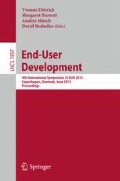Abstract
Human beings often make decisions without fully realizing the factors that influence their choices. A woman buys the same type of car that most of her neighbors drive. A man at a salad bar loads up on the croutons that are in the front row of items instead of olives that are in the middle row. While these mindless decisions aren’t always deleterious, they may not be what a person most desires or what is best for them. Deciding mindfully, however, may provide a person the opportunity to be fully aware of their choices and select the best outcome based on their needs. Socio-technical systems can be designed to support mindful decision making, and these systems can benefit from the incorporation of end-user controls. End-user controls can provide users with opportunities to analyze new information and create new categories, two useful techniques in fostering mindful behaviors and decisions. This paper discusses how end-user controls that support mindful decision making will be added to EMPIRE, a socio-technical system designed to help consumers reduce their electricity consumption.
Access this chapter
Tax calculation will be finalised at checkout
Purchases are for personal use only
Preview
Unable to display preview. Download preview PDF.
References
Dayan, E., Bar-Hillel, M.: Nudge to nobesity II: Menu positions influence food orders. Judgment and Decision Making 6(4), 333–342 (2011)
Geier, A., Wansink, B., Rozin, P.: Red Potato Chips: Segmentation Cues Can Substantially Decrease Food Intake. Health Psychology (2012) (Advance online publication)
Rozin, P., Scott, S., Dingley, M., Urbanek, J.K., Jiang, H., Kaltenbach, M.: Nudge to nobesity I: Minor changes in accessibility decrease food intake. Judgment and Decision Making 6(4), 323–332 (2011)
Cialdini, R.B.: Influence: Science and Practice, 5th edn. Prentice Hall, New Jersey (2008)
Schultz, P.W., et al.: The constructive, destructive, and reconstructive power of social norms. Psychological Science: A Journal of the American Psychological Society/APS 18(5), 429–434 (2007)
Geelen, D., et al.: Exploring the use of a game to stimulate energy saving in households. Journal of Design Research 10(1), 102–120 (2012)
Kabat-Zinn, J.: Wherever you go, there you are: Mindfulness meditation in everyday life. Hyperion (1995)
Johnson, E., Weber, E.: Mindful judgment and decision making. Annual Review of Psychology 60, 53 (2009)
Langer, E.J.: Mindfulness. Addison-Wesley/Addison Wesley Longman (1989)
Dick, H., et al.: Empowering users to become designers: using meta-design environments to enable and motivate sustainable energy decisions. In: Proceedings of the 12th Participatory Design Conference: Exploratory Papers, Workshop Descriptions, Industry Cases, vol. 2, pp. 49–52. ACM, Roskilde (2012)
Ekman, P., Friesen, W.: Constants across cultures in the face and emotion. Journal of Personality and Social Psychology 17(2), 124–129 (1971)
Frijda, N.: Emotions and Action. In: Manstead, A., Frijda, N., Fischer, A. (eds.) Feelings and Emotions: The Amsterdam Symposium. Studies in Emotion and Social Interaction. Cambridge University Press (2004)
Author information
Authors and Affiliations
Editor information
Editors and Affiliations
Rights and permissions
Copyright information
© 2013 Springer-Verlag Berlin Heidelberg
About this paper
Cite this paper
Zietz, J. (2013). Socio-technical Systems That Foster and Support Mindfulness Can Benefit from End-User Control Mechanisms. In: Dittrich, Y., Burnett, M., Mørch, A., Redmiles, D. (eds) End-User Development. IS-EUD 2013. Lecture Notes in Computer Science, vol 7897. Springer, Berlin, Heidelberg. https://doi.org/10.1007/978-3-642-38706-7_29
Download citation
DOI: https://doi.org/10.1007/978-3-642-38706-7_29
Publisher Name: Springer, Berlin, Heidelberg
Print ISBN: 978-3-642-38705-0
Online ISBN: 978-3-642-38706-7
eBook Packages: Computer ScienceComputer Science (R0)

